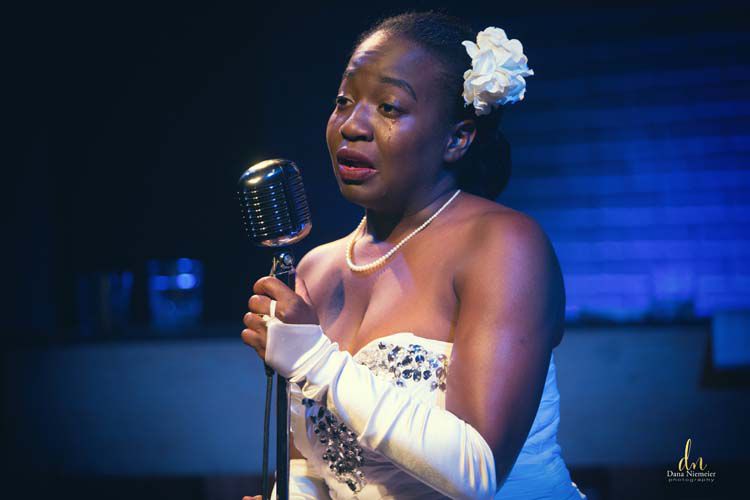
Melbourne’s New Haven Avenue was a madhouse for the last Friday Fest, like a major urban center. Steps away, though, in the intimacy of the black box space upstairs at the Henegar Center, the dark urbanity of another era played out.
The bruising but beautiful slice of life of the great jazz singer Billie Holiday that played out in “Lady Day at the Emerson Bar and Grille” was almost too sad to sit back and enjoy. Kristen Warren left you guilt-ridden for grinning at her irreverent, seductive and thoroughly broken portrayal of Holiday.
The play is a fictional recreation of one of the great jazz singer’s last performances. Directed by Pam Harbaugh, the former culture columnist for Florida Today, with music direction by Jordan Evans, to whom Harbaugh gives great credit, the play takes place in a bar where Holiday was once a regular; now, she appears with a different piano player and a heavier habit. And not only drinking, which she does with relish on stage, but heroin too. She shoots up during an off-stage break, returning with one white-satin sleeve still pushed up over her arm; a band member steps up to roll it back into place.
Such tender details played out in the remarkable production at the Henegar that sadly closed last weekend – with even an added show sold out within minutes of its being offered. Cast with local talent, it was essentially a one-woman show. Yet there was a sense that Holiday’s band backed up more than just her singing; they had the back of Warren’s Holiday, to the bitter end.
The young trio included brothers Ashton and Ethan Bailey-Gould (Ashton is a student at Eastern Florida State College and Ethan is at Melbourne High). They were anchored by 23-year-old jazz pianist Jarred Armstrong, a native of St. Petersburg now living in Daytona; equally talented on the alto sax, Armstrong is a student at Bethune-Cookman University.
“Lady Day” was written in 1986 by Lanie Robertson. It didn’t make it to Broadway until 2014, when it starred Audra McDonald. She won a Tony for her role and reprised the role in 2016 for a taping that was broadcast on HBO.
The set is a reincarnation of a banged-up south Philly nightclub in 1959. The evening plays out just months before Billie’s death at 44 of cirrhosis of the liver. Robertson incorporates biographical detail of the seminal jazz singer in between performances of some of her most famous songs, from “What a Little Moonlight Can Do” and “Crazy He Calls Me” to the grisly “Strange Fruit” — that last being just one of many powerful references to a too-routine racism Holiday managed to endure.
Not for an instant did Warren let go of her Billie, even as she slides into near-incoherence, the higher she gets and the more perilously candid her story-telling becomes. Warren’s alternately sassy and sweetly vulnerable voice, down to the trailing warble of each familiar line, closely resembled Holiday’s; Warren sings with various jazz groups around Melbourne and Orlando and is focusing on recording, she says.
Invited by Henegar artistic director Hank Rion to stage “Lady Day,” Harbaugh didn’t have to go far to find her Billie. Kristen Warren is a former student of Harbaugh’s when she ran the Junior Theater Workshop for the Satellite Beach Recreation Department. Warren, whose father was the public information officer for Patrick Air Force Base, was around 10 at the time.
Two years ago, Warren played Joanne in the Cocoa Village Playhouse production of “Rent,” and “nearly stole the show,” recalls Harbaugh. Before she was cast in this play, Harbaugh and Rion asked her to perform at an open-mic night at Heidi’s, the famous jazz club in Cocoa Beach. “We of course loved her,” says Harbaugh. “But we still needed to know if she could land the emotional weight of this show.”
At a formal Henegar audition, Warren did a monologue, “and yeah, oh yeah!” says Harbaugh.
It was not only Warren’s finely-tuned acting and gorgeous vocals that made her a stand out in “Lady Day”; her stamina never faltered over the course of an hour-and-half show. She never dropped a line, according to Harbaugh, even though her character has all but a half-dozen in the show.
“She has that stuff down cold,” said Harbaugh. “I threw the gauntlet at her feet and she picked it up and ran with it.”
Through it all, Warren’s Billie kepy her wry sense of humor.
“It was crucial for her to not feel sorry for herself,” Harbaugh says. “When a character does that, it doesn’t leave any room for the audience to feel it.”
The audience felt it, I can testify. It ached to applaud such misery. But oh, the spectacular jazz.
We can only hope this “Lady Day” finds its way to a stage again soon.



